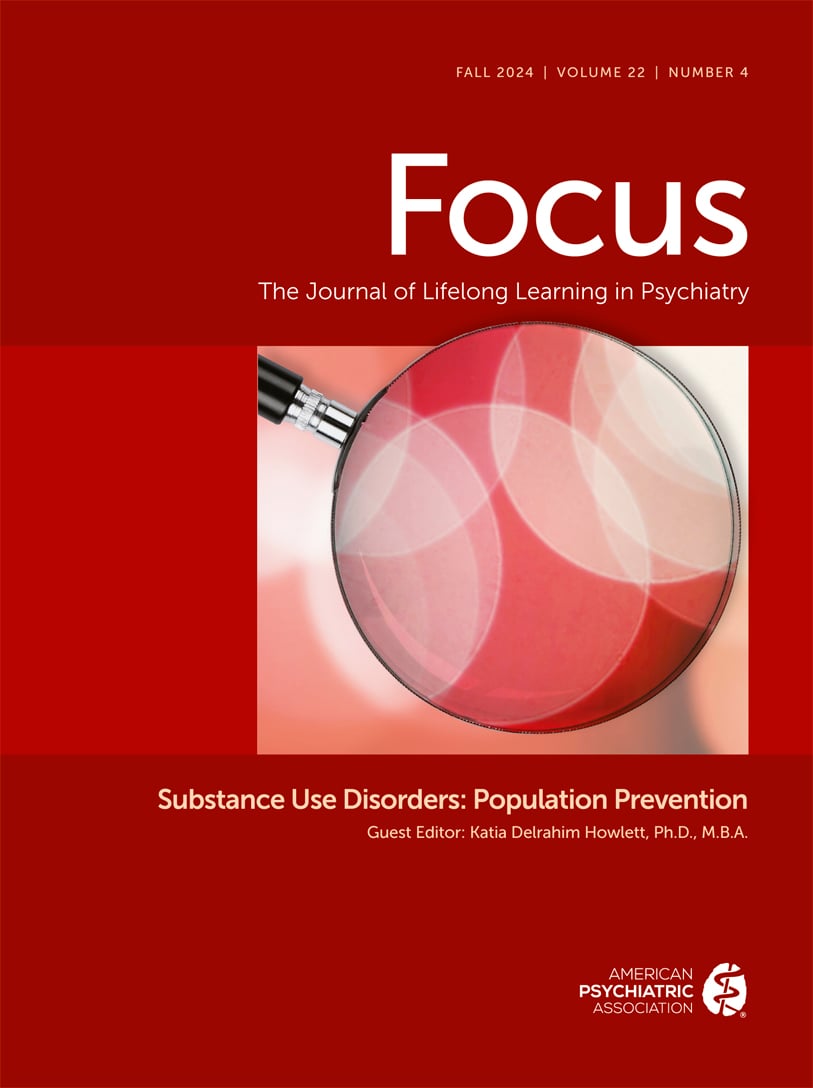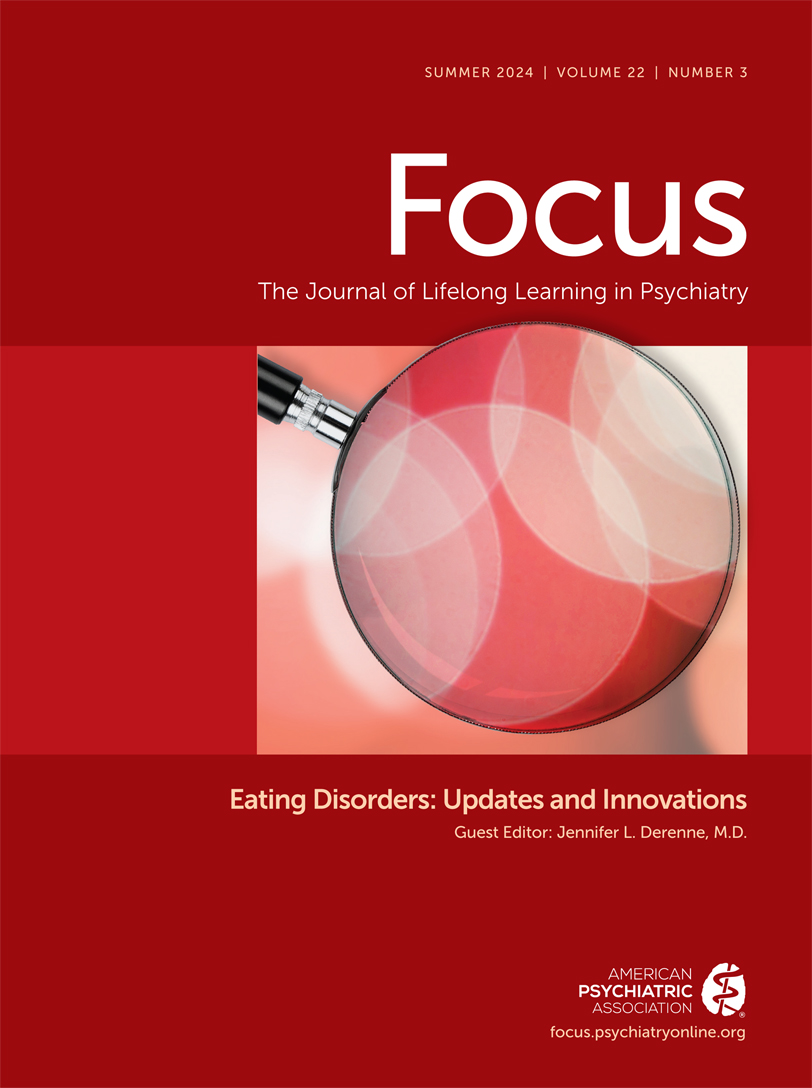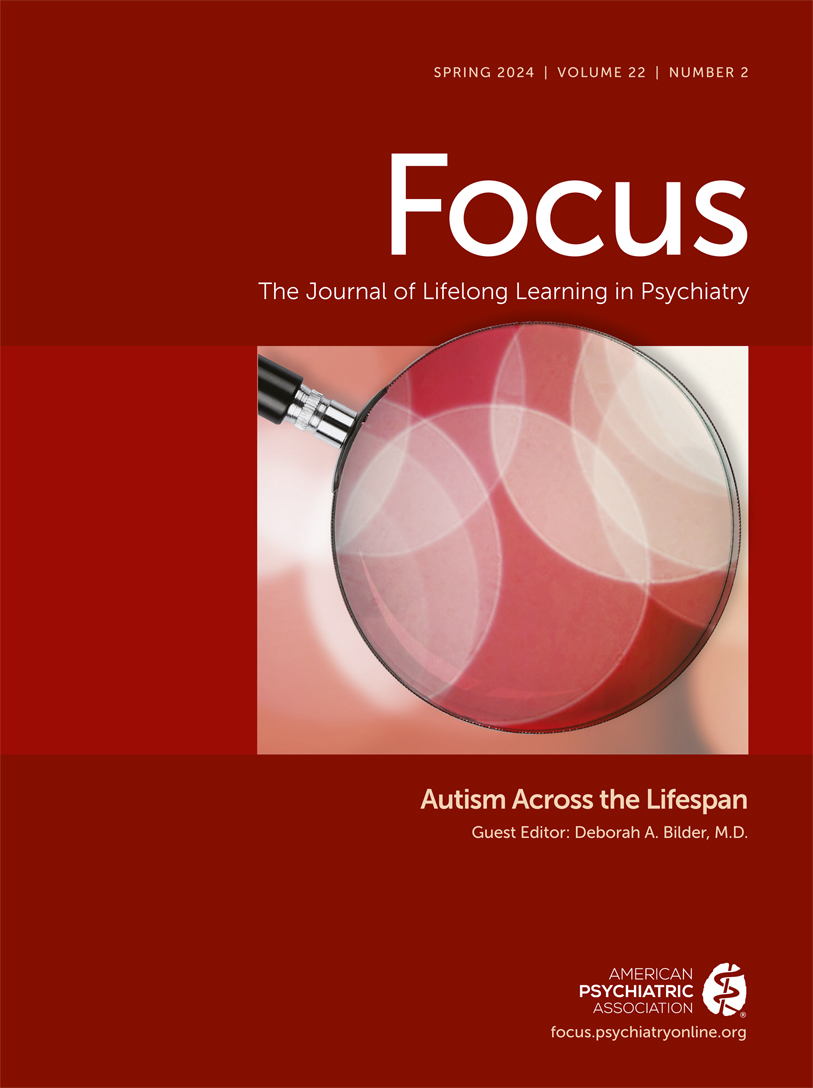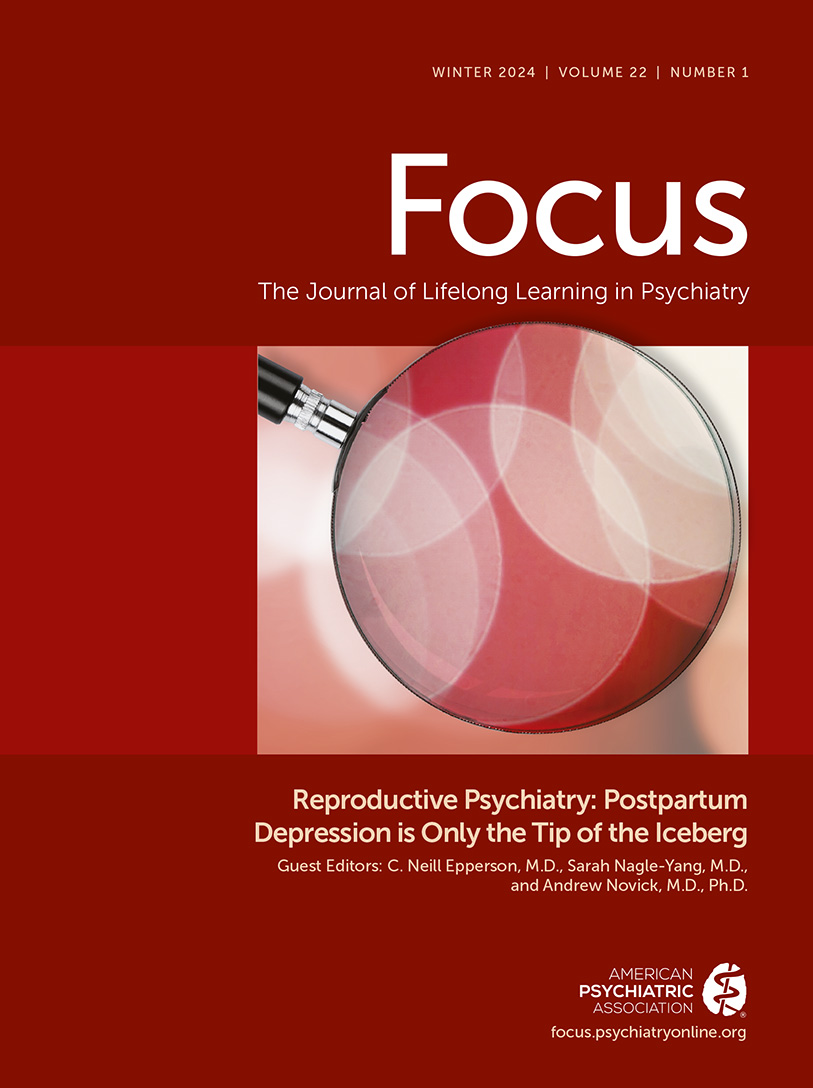Focus
- Volume 18
- Number 2
- April 2020
From the Guest Editor
Reviews
Publication date: 01 April 2020
Pages88–99Despite increased access to mental health care for the previously uninsured and expanding evidence-based treatments for mood, anxiety, psychotic, and substance use disorders, suicide is on the rise in the United States. Since 1999, the age-adjusted ...
https://doi.org/10.1176/appi.focus.20200011Publication date: 01 April 2020
Pages100–105Psychiatrists are on the front lines of two simultaneous public health crises: the increasing rates of suicide and opioid-related deaths. In this review, the authors discuss ways in which these two classes of preventable deaths may be linked, with an ...
https://doi.org/10.1176/appi.focus.20200003Publication date: 01 April 2020
Pages106–119Whether a major depressive episode occurring in the postpartum period (i.e., postpartum depression [PPD]) is sufficiently distinct from major depressive episodes occurring at other times (i.e., major depressive disorder) to warrant a separate diagnosis is ...
https://doi.org/10.1176/appi.focus.20190045Clinical Synthesis
Publication date: 01 April 2020
Pages120–128According to the World Health Organization, major depressive disorder is the world’s leading cause of disability. If clinical remission is not attained and sustained, episodes tend to recur with greater severity and with lessening responsivity to ...
https://doi.org/10.1176/appi.focus.20200008Publication date: 01 April 2020
Pages129–138This article focuses on some common dilemmas facing clinicians, patients, and families in managing the treatment of complicated mood disorders. Specifically, this article reviews the interaction of depressive states, including unipolar, bipolar, and mixed,...
https://doi.org/10.1176/appi.focus.20200007Publication date: 01 April 2020
Pages139–149Adolescents often present to treatment with multiple psychiatric diagnoses. The presence of certain co-occurring mental health conditions can significantly affect an individual’s treatment course. Adolescence is also a time of developmentally appropriate ...
https://doi.org/10.1176/appi.focus.20190038Publication date: 01 April 2020
Pages150–161Depression is common among patients with neurologic disorders, and it has long been considered more difficult to treat than depression in the general population. In this review, the authors consider challenges in the diagnosis and treatment of depression ...
https://doi.org/10.1176/appi.focus.20200004Publication date: 01 April 2020
Pages162–168A surge in the development of computer-assisted cognitive-behavioral therapy (CCBT) and mobile apps for depression has provided many tools with potential for enhancing treatment delivery. This article assesses progress in evaluation and implementation of ...
https://doi.org/10.1176/appi.focus.20190044Publication date: 01 April 2020
Pages169–174Rapid changes in health care technology are advancing mental health care. Telepsychiatry, in the form of live interactive videoconferencing, has demonstrated its ability to improve access to high-quality mental health care, specifically in the treatment ...
https://doi.org/10.1176/appi.focus.20190039Publication date: 01 April 2020
Pages175–180Current management of psychiatric disorders relies heavily on retrospective, subjective reports provided by patients and their families. Consequently, psychiatric services are often provisioned inefficiently and with suboptimal outcomes. Recent advances ...
https://doi.org/10.1176/appi.focus.20190042Publication date: 01 April 2020
Pages181–192Numerous short-term randomized trials support the acute-phase efficacy of low-dose intravenous (IV) ketamine for patients with treatment-resistant unipolar or bipolar depression. Ketamine’s antidepressive effects generally have limited duration, ...
https://doi.org/10.1176/appi.focus.20190048Patient Management Exercise
Communication Commentary
Ethics Commentary
Bibliography
Abstracts
Influential Publications
Publication date: 01 April 2020
Pages211–219Background: Depression is the single largest contributor to non-fatal health loss worldwide. Second-generation antidepressants are the first-line option for pharmacological management of depression. Optimising their use is crucial in reducing the burden of ...
https://doi.org/10.1176/appi.focus.18204Publication date: 01 April 2020
Pages220–235Treatment outcomes for major depressive disorder (MDD) need to be improved. Presently, no clinically relevant tools have been established for stratifying subgroups or predicting outcomes. This literature review sought to investigate factors closely linked ...
https://doi.org/10.1176/appi.focus.18205Publication date: 01 April 2020
Pages236–243Objective: Subanesthetic ketamine doses have been shown to have rapid yet transient antidepressant effects in patients with treatment-resistant depression, which may be prolonged by repeated administration. The purpose of this study was to evaluate the ...
https://doi.org/10.1176/appi.focus.18206Publication date: 01 April 2020
Pages244–254Specific challenges that profoundly affect the outcome of treatment for depression include 1) patient engagement and retention in care and optimization of treatment adherence, 2) optimization of symptom and side effect control by medication adjustments ...
https://doi.org/10.1176/appi.focus.18207Past Issues
View Issues Archive
Vol. 22 | No. 4

Vol. 22 | No. 3

Vol. 22 | No. 2
